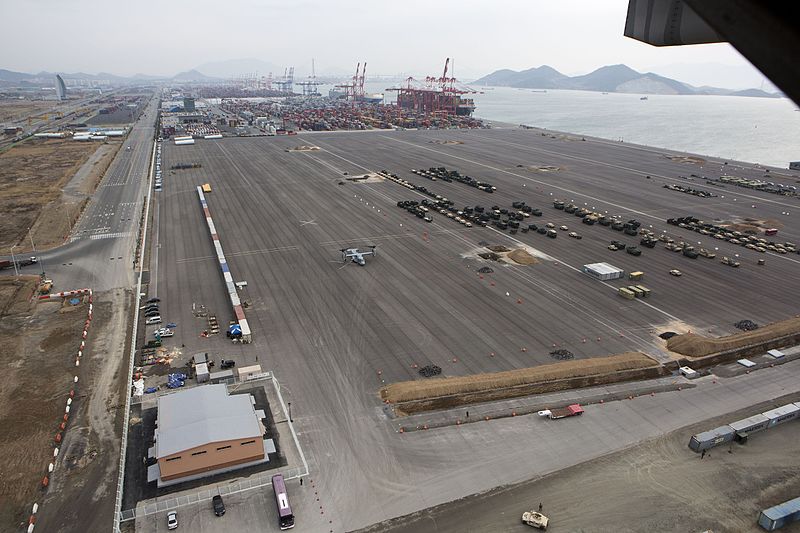Unionized truckers in South Korea went on strike, protesting the rising prices of gas and the minimum pay. This week, the truckers and the government reached a settlement, effectively ending the strike.
Reuters reports the unionized truckers reached an agreement with South Korea's transport ministry Tuesday, ending the nationwide strike that lasted for eight days.
The strike by the truckers was related to the rising prices of gas as well as the minimum pay demands, and the strike caused a disruption of car production, a delay in shipments for semiconductors, and a shutting down of steel plants.
As one of the responses to the truckers' strike, the Transport ministry consigned around 100 cargo trucks that would be operated by the South Korean military to ship containers in and out of ports, including Busan.
The military shipped containers to and from locations mainly short distances with the ports in order to make more space.
As part of the agreement between the union and the Transport Ministry, the minimum freight rates would be extended and continued discussions to expand a guarantee of minimum pay for carrying cargo to cover additional products. The Transport Ministry will also conduct a review on expanding fuel subsidies.
"So the strike has been called off until our demands are passed in parliament," said the head of the union's Busan chapter Park Jung-hoon. "In the next two to three days, 100 percent of unionized workers are expected to return to work after they get some rest. There might be some shippers who seek retributions, and in such cases, we will respond strongly."
The interim leader of South Korea's liberal Democratic Party Woo Sang-ho, whose party currently holds the majority in the country's parliament, welcomed the agreement but noted the aspect of guaranteeing freight rates would require legislative action and called for "fundamental improvement" in order to address the conditions that workers are facing.
In a joint statement with the party committee and the union, it said the ruling political party must not stay a "mediator, but should promote directly" the minimum freight system as it is related to the safety of the people.



 Japan’s Prime Minister Sanae Takaichi Secures Historic Election Win, Shaking Markets and Regional Politics
Japan’s Prime Minister Sanae Takaichi Secures Historic Election Win, Shaking Markets and Regional Politics  Sydney Braces for Pro-Palestine Protests During Israeli President Isaac Herzog’s Visit
Sydney Braces for Pro-Palestine Protests During Israeli President Isaac Herzog’s Visit  Bosnian Serb Presidential Rerun Confirms Victory for Dodik Ally Amid Allegations of Irregularities
Bosnian Serb Presidential Rerun Confirms Victory for Dodik Ally Amid Allegations of Irregularities  Trump Congratulates Japan’s First Female Prime Minister Sanae Takaichi After Historic Election Victory
Trump Congratulates Japan’s First Female Prime Minister Sanae Takaichi After Historic Election Victory  Jack Lang Resigns as Head of Arab World Institute Amid Epstein Controversy
Jack Lang Resigns as Head of Arab World Institute Amid Epstein Controversy  Trump Slams Super Bowl Halftime Show Featuring Bad Bunny
Trump Slams Super Bowl Halftime Show Featuring Bad Bunny  Trump Lifts 25% Tariff on Indian Goods in Strategic U.S.–India Trade and Energy Deal
Trump Lifts 25% Tariff on Indian Goods in Strategic U.S.–India Trade and Energy Deal  Nicaragua Ends Visa-Free Entry for Cubans, Disrupting Key Migration Route to the U.S.
Nicaragua Ends Visa-Free Entry for Cubans, Disrupting Key Migration Route to the U.S.  China Warns US Arms Sales to Taiwan Could Disrupt Trump’s Planned Visit
China Warns US Arms Sales to Taiwan Could Disrupt Trump’s Planned Visit  Ohio Man Indicted for Alleged Threat Against Vice President JD Vance, Faces Additional Federal Charges
Ohio Man Indicted for Alleged Threat Against Vice President JD Vance, Faces Additional Federal Charges  Israel Approves West Bank Measures Expanding Settler Land Access
Israel Approves West Bank Measures Expanding Settler Land Access  Trump Backs Nexstar–Tegna Merger Amid Shifting U.S. Media Landscape
Trump Backs Nexstar–Tegna Merger Amid Shifting U.S. Media Landscape  Bangladesh Election 2026: A Turning Point After Years of Political Suppression
Bangladesh Election 2026: A Turning Point After Years of Political Suppression  Trump Says “Very Good Talks” Underway on Russia-Ukraine War as Peace Efforts Continue
Trump Says “Very Good Talks” Underway on Russia-Ukraine War as Peace Efforts Continue  Trump’s Inflation Claims Clash With Voters’ Cost-of-Living Reality
Trump’s Inflation Claims Clash With Voters’ Cost-of-Living Reality  Antonio José Seguro Poised for Landslide Win in Portugal Presidential Runoff
Antonio José Seguro Poised for Landslide Win in Portugal Presidential Runoff  New York Legalizes Medical Aid in Dying for Terminally Ill Patients
New York Legalizes Medical Aid in Dying for Terminally Ill Patients 































